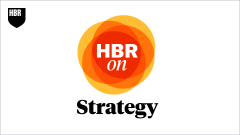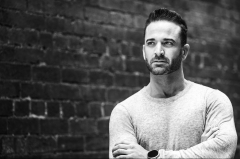In June 2022, the first ever LIV Golf event teed off outside of London. Offering players larger prizes and more flexibility, LIV Golf aimed to disrupt the sport.
In response, the PGA Tour suspended all players who participated in the LIV Golf event, escalating tensions between the two entities. This conflict culminated in LIV Golf filing an antitrust lawsuit against the PGA Tour. Then, in a surprising turn of events, the two tours announced their merger in June 2023.
University of Virginia associate professor Alexander MacKay discusses the competitive and regulatory issues at stake and whether or not the PGA Tour took the right actions in response to LIV Golf’s entry in his case, “LIV Golf.” In this episode, he explores how a dominant organization like the PGA Tour can respond to challenges from innovative competitors. He also shares lessons from the PGA Tour’s response to LIV Golf’s market entrance and explains when it makes more sense to treat a competitor as a partner rather than an adversary.
Key episode topics include: strategy, business management, antitrust laws, disruptive innovation, professional sports industry, media, entertainment, and professional sports, golf, merger.
HBR On Strategy curates the best case studies and conversations with the world’s top business and management experts, to help you unlock new ways of doing business. New episodes every week.
- Listen to the original HBR Cold Call episode: The PGA Tour and LIV Golf Merger: Competition Vs. Cooperation (2023)
- Find more episodes of Cold Call
- Discover 100 years of Harvard Business Review articles, case studies, podcasts, and more at HBR.org
HANNAH BATES: Welcome to HBR On Strategy, case studies and conversations with the world’s top business and management experts, hand-selected to help you unlock new ways of doing business.
How should a dominant organization, like the PGA Tour, respond to a challenge from an innovative new competitor? What can we learn from the PGA Tour’s response to LIV’s entrance into its market? And at what point does it make more sense to treat a competitor as a partner?
Today, we bring you a conversation with former Harvard Business School associate professor Alex MacKay, who studied the competitive and regulatory issues at stake for a business case study he wrote about LIV Golf and the PGA Tour.
This episode originally aired on Cold Call in September 2023. Here it is.
BRIAN KENNY: On July 11th, 2023, the Senate Permanent Subcommittee on Investigations convened a hearing on a proposed merger of the PGA Tour and its upstart rival, the LIV Golf tour. Golf may be a genial game, but there was nothing cordial about the demeanor of the committee members who teed off on PGA Tour executives for over three hours, firing question as in expressing their concerns about the configuration of the deal and its implications on the global stage. It’s a hearing that just weeks earlier would’ve been unimaginable because since its launch in 2022, the LIV tour was vilified by the PGA Tour as the avowed enemy of golf, the beneficiary of a rich, but ruthless foreign regime seeking to cleanse its reputation by association with the sport. The PGA Tour was the keeper of the flame, sworn to uphold the integrity of the ancient but honorable game. One that has remained virtually unchanged since the rules of golf were first formalized in Lieth, Scotland in 1744, but as we often see, disruption happens when you least expect it. Today on Cold Call, we’ve invited Professor Alex MacKay to discuss his case titled, “LIV Golf.” I’m your host, Brian Kenny, and you’re listening to Cold Call on the HBR Podcast Network. Alex MacKay’s Research focuses on matters of competition, including pricing, demand, and market structure. And today we’re here to talk about a subject near and dear to my heart, which is golf. Alex, thanks for joining me.
ALEX MACKAY: Brian, it’s a pleasure to be here.
BRIAN KENNY: I was very excited when I heard that you were writing this case because I’m a golfer. I really love the game and like anybody who follows golf, this was an amazing series of events that started back in 2022 and continues to unfold in really unexpected ways. So I think people will love hearing more about this as a case of disruptive innovation within an existing sports league, but also some of the drama that surrounds it and some of the politics. So thanks for being here to talk about it.
ALEX MACKAY: Yeah, it’s been very exciting for sure.
BRIAN KENNY: So why don’t we just start by asking you what the central issue is in the case and what your cold call is to start the discussion in class?
ALEX MACKAY: I’ll just provide a little bit of background. This case is set at the end of 2022. So LIV Golf had just completed its first season and right away when it launched in June, things got very contentious between LIV Golf and the PGA Tour. Immediately, some players from the PGA Tour that participated in LIV were suspended, and players that sort of were on both sides of this divide were saying very contentious things to each other. In August, LIV Golf actually launched an antitrust lawsuit against the PGA Tour, which accused them of committing anti-competitive practices that were legal violations. And in September, the PGA Tour filed a countersuit. The DOJ said it was going to investigate the actions the PGA Tour had taken against LIV Golf. So it was a very heated time, and the key question we address in class is or we kick things off with is, should the PGA Tour continue to fight LIV Golf or should it try to cooperate? Now, we’ve had an update since then on what the PGA Tour has tried to do, and I think it’s still valuable to think about that question in light of the changes in the reaction of the players. But the second question we get to, and I think it’s still very important to think about from a business point of view, is should the PGA Tour have done anything differently? And you can evaluate that in light of what they did in 2022, but you can also evaluate that leading up to 2022 as far back as 2019, 2015, or even before that. How did the PGA Tour allow the entry of LIV to happen, and did they take the right actions in response?
BRIAN KENNY: Yeah. Those are great questions and we’ll touch on some of that. Why did you decide to write this case?
ALEX MACKAY: So I teach a course on competition, antitrust and regulation, and my research covers these same themes. So I’m very interested in questions about market power when a large firm has the ability to exert influence over its customers and other market participants. And this situation with the PGA Tour and LIV Golf is actually a great example of that. We have a new entrant in a market with a large established competitor, so we can evaluate the responses by this large established competitor, and in particular, the legal limits of the behavior as established by antitrust law.
BRIAN KENNY: Yeah, I mean, as I read the case, I was thinking about the fact that it seems to me like most sports leagues are monopolistic, the NFL, the Major League baseball. What was the L scape in golf before LIV came around?
ALEX MACKAY: Before LIV, the PGA Tour was the dominant professional golf tour, globally. The second tour was the European tour, which Rory McIlroy had at one point called a stepping stone to the PGA Tour. So that’s how players generally viewed the competition, the different tours. And so there were a number of other tours, but none quite the size of the PGA Tour. Now, there are also the four major events, and it’s important to distinguish those because the four major golf tournaments are actually run independently from the PGA Tour, and that distinction is actually a big factor in the fight between LIV and the PGA Tour, as I’m sure we’ll get to. So those four events are run independently, but for the most part, the top professional golfers are affiliated with the PGA Tour and then also play in the four majors.
BRIAN KENNY: Okay, so there’s a bit of, there’s co-opetition there, I guess is one way to describe it.
ALEX MACKAY: Yes, exactly.
BRIAN KENNY: Okay. So the PGA Tour, I think somewhat surprisingly, is a nonprofit organization. How do they make their money? What’s their business model?
ALEX MACKAY: So they operate about 40 weekly events and including the main tour, they also have the developmental tours. They primarily make money through media rights and by selling sponsorships for individual tournaments. So for example, in 2020, they signed a nine year 6.3 billion dollar deal with CBS and NBC to broadcast roughly 30 of their main events. And they also have streaming deals and other features of the media rights, and in addition to the sponsorship, all that adds up to a good deal of money. In 2019, they reported 1.5 billion dollars of revenue.
BRIAN KENNY: But how do they maintain their nonprofit status?
ALEX MACKAY: Yeah, so that’s an interesting question. Of the 1.5 billion dollars, about 500 million is paid out to players in terms of events and in terms of prize money. And there’s other money that’s given to employees of the PGA Tour, but they actually made about 70 million dollars in net earnings. They can maintain their nonprofit status because they raise a good deal for charity. So a good deal of the money they raise does go to charity. In 2019, it was about 204 million. And for sports leagues, they can register as a nonprofit if they also sort of have a mission statement that promotes a common interest. And so this is something that many of the leagues had at one point. So the Major League Baseball and the NFL were at one point nonprofits, but they gave those up in 2007 and 2015 because a key distinction is they should not be engaging in the regular business of a kind to generate profit. And there’s a little bit of a fine line there between are they generating profit or are they promoting the common interest of a sport?
BRIAN KENNY: Yeah. I want to talk a little bit about the sort of spirit of competition on the PGA tour and professional golf. If you look at other sports leagues, they’re all comprised of teams and it’s people playing together to accomplish something. Golf is one of the only sports where you’re playing as an independent agent, I guess, for lack of a better word. And there’s no farm league per se. There are golfers who come up through the college circuit. There are golfers who just attempt it on their own. How do you qualify to get on the PGA Tour?
ALEX MACKAY: On the PGA Tour, the players are all independent contractors that sort of have to make the case that should be on the tour. And the main way they do it is just by playing really excellent golf. So they can play on these developmental tours the PGA Tour runs, and they can get developmental points. And at some point, once you hit a certain threshold, you qualify for the tour. Now, qualifying for the tour isn’t sort of the end though. The PGA Tour maintains a ranking list for its players based on the points they’ve accumulated. And that ranking list sort of determines which players enter each of the PGA tours events. So you could be on the tour, but you may not qualify for the field for a particular event, especially the most prestigious ones if you don’t place high enough on that ranking list.
BRIAN KENNY: So it’s like it is a meritocracy by definition, and your commitments there don’t end as a player. You’re responsible for financing your travel, and if you’ve got coaches, you’ve got to pay your own team, and you also have obligations to the tour itself. Can you talk a little bit about that?
ALEX MACKAY: It could easily cost the players over a hundred thousand dollars for equipment training, travel, that sort of thing. If you don’t win any prize money over the course of the year, you could actually lose money as a PGA Tour player, at least until 2022 when the PGA Tour implemented some changes along those lines. Now, as a member to maintain your membership, you’re also required to participate in a certain number of events, typically at least 15 events. And you’re also prohibited from playing in other golf tournaments or appearing on any golf broadcast unless you have a release from the commissioner of the PGA Tour.
BRIAN KENNY: And all of this becomes really relevant when we talk about the LIV tour and what it means to be a player on the LIV tour, which is really different than on the PGA Tour. So we’re going to get to that in a minute. Before we do, I wanted to talk a little bit about antitrust laws and how they apply to professional sports leagues, because that really is at the heart of what’s going on between these two entities.
ALEX MACKAY: And actually, for the most part, antitrust laws apply to professional sports leagues, just like any other organization. If you think about professional football, basketball, and hockey leagues, they consist of independent teams that are under separate ownership. Now, the one exception here is Major League Baseball, which has its own antitrust exemption that’s specifically carved out for that league. What’s happened for the other sports though, is they have received specific exemptions. One of them is to negotiate for media rights. So that’s why the NFL can collectively bargain for media rights. And the other is because the players in the NFL are unionized, the NFL can act as a single entity when negotiating with t





